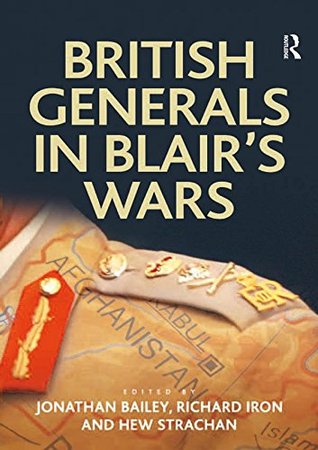British Generals in Blair’s Wars is a collection of essays covering the British Army’s campaigns during the premiership of Prime Minister Tony Blair from 1997 to 2007 and their aftermath. This period saw significant success for the United Kingdom in the Balkans, Sierra Leone and in closing out the long campaign in Northern Ireland, but also covers the time period during what are widely seen as significant failures in Iraq and Afghanistan. The confidence of the British Army was undoubtedly dented by these experiences and gave rise to a period of introspection perhaps not seen since the aftermath of the Second Boer War.
One of the major strengths of this work is that it is based on essays prepared contemporaneously, without the benefit of hindsight, by the various general officers involved. This offers an important glimpse into the operational and strategic pressures of the time, and evolution of the various problems. The essays are almost without exception critical of the way operations were conducted, noting a number of essays from serving officers were withdrawn after the UK Ministry of Defence withheld permission for publication. The key themes of the book are the failure of UK strategic and operational planning, and disconnect between military and political leadership. These themes offer insight into the past and lessons for the conduct of future operations.
The book is organised into five parts covering an introduction and formative interventions, two sections on Iraq, one on Afghanistan and a conclusion including insight from eminent historian Professor Hew Strachan. Strachan is particularly scathing of the decline of Britain’s military-political strategic thinking, especially in following the US into Iraq when the US itself had not clearly defined strategy except for the overthrow of Saddam. This book also contains a chapter by the iconoclastic and always entertaining General Sir Graeme Lamb who describes his fellow contributors; ‘The majority I rate as fair, a few I would gladly join and assault hell’s gate, and some I wouldn’t follow to the latrine.’
Of particular interest are the chapters on the later Iraq period between 2006 and 2009 when the British were involved in an increasingly kinetic battle against Iranian backed Shia militias in Basra while also heavily involved in evolving and escalating operations in southern Afghanistan. The commanders were left facing a complex threat with diminishing troop numbers in a theatre in which British political interest was waning while at the same time the United States was launching into the ‘Surge’. The commanders on the ground were left with few good alternatives. Positive measures taken, such as the long running Operation Sinbad, were critically under-resourced. The ultimate withdrawal from Basra was easily painted as a victory for the militia but also led to a significant loss of confidence in the British effort by the Americans. This became such a problem that the last UK rotation had the maintenance of British military reputation as one of its key aims.
There are several other themes of interest including the dislocation in approach between the British led formations in southern Iraq and Helmand, and the in-theatre commanders answering more to London than Baghdad or Kabul. The reliance on six monthly rotations without an overarching plan saw each brigade conduct a campaign largely disconnected from its predecessors or successors. Another key factor was the decision not to routinely embed training elements with Iraqi security forces. This hampered their development and left them open to infiltration by Shia militias. This was contrary to historical British success in raising local forces. Those in senior theatre command or deputy command positions also reflect on their frustrations with London’s lack of responsiveness to in-theatre situation changes which often left them reliant on US resources. The lack of a realised ‘whole of government’ effort in both theatres, despite an emerging ‘comprehensive approach’ doctrine, is another acknowledged critical failing which has lessons for future Australian operations.
This is an interesting, thought-provoking albeit downbeat book covering some of the challenges of recent Coalition operations from the perspective of one of our major allies. It is worth reading in combination with Major General Jim Molan’s ‘Running the War in Iraq‘ for an Australian perspective.
British Generals in Blair’s Wars, edited by Jonathan Bailey, Richard Iron and Hew Strachan, Ashgate Publishing Limited, 2013, ISBN9781409437369
About the author
Major Daniel Hebditch is an engineer officer. He has masters degrees in Military History and Defence Studies.

